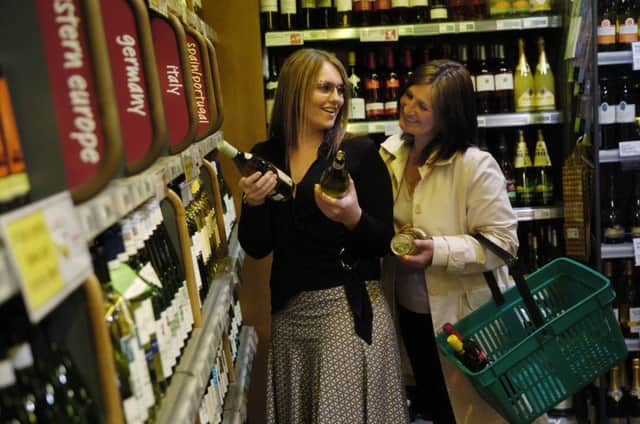Kenny MacAskill: Minimum alcohol pricing was 10-year struggle


It was obvious that action needed to be taken not just to protect citizens from harm but individuals from themselves. Almost 80 per cent of inmates at Polmont Young Offenders Institution said their actions had been fuelled by alcohol.
Of course, it wasn’t the drink that did it and they were required to face the consequences, but had they been less drunk it often wouldn’t have happened. Allied to that were tragedies where young people thought they were immortal only to discover that despite the drink they were still human.
Advertisement
Hide AdAdvertisement
Hide AdSo, a range of measures were brought in to deal not just with the sale and promotion of alcohol but address a wider culture. Some argued all that was needed was more education but this had been tried and failed. More direct action was needed.
Licensing laws were changed and steps taken to stop promotion of alcohol whether through two-for-one deals or product placement. Licensing Boards were also strengthened to address over-provision where alcohol sales outlets were saturating and harming communities. The proposals on minimum pricing followed on from that but faced deep hostility. Moreover, there was growing evidence that alcohol abuse wasn’t simply affecting the young but was a wider issue across society. Accordingly it moved from a justice to a health measure.
The then Health Secretary and now First Minister – Nicola Sturgeon – pursued it with aplomb. Despite the attempt to mitigate opposition, it still was unsuccessful when pursued by the minority SNP Government.
The kneejerk objection to it by Labour, in particular, saw them pay a heavy political price in the 2011 election. However, when it was later reintroduced, it sailed through the Scottish Parliament with widespread support in 2012.
Though political pressure abated, the opposition of the Scotch Whisky Association (SWA) remained implacable. They were the most hostile and aggressive lobbying group I came across in ministerial office, even seeking to undermine me by complaining to Alex Salmond, the then First Minister, and implying that the problem was my handling of the issue – not their intransigence. Accordingly, at one stage he even flew to Paris convinced his known charms could alter the attitude of a major producer, but it was to no avail.
Objections to the policy were, of course, not uniform across the alcohol sector. The Scottish Licensed Trade Association was supportive of MUP as they saw the pub trade obliterated by cheap sales in supermarkets. Likewise, some brewers objected to their cans being bought on an industrial scale for pennies and sold cheaply, when they wished to promote a higher cost, more premium product.
Nor was opposition to MUP uniform across the distilling sector. However, a major supplier that was willing to endorse the idea, was soon lent upon by the SWA and was muted. The SWA’s opposition thereafter increased and remained resolute throughout despite the growing evidence of the harm being caused and the lives being lost.
They’ve argued that MUP was illegal and that it would affect them internationally. But, perhaps the real answer lies closer to home. Someone makes these cheap, high-strength drinks that cause so much harm. The main players in the SWA aren’t small local distillers, but major multinational companies. Vodka and cider is worth more than whisky, blended or malt. It’s corporate profits, not public health that dictated.
Advertisement
Hide AdAdvertisement
Hide AdTheir actions were shameful and against the national interest. Yet they demand and all too often get supine support from Scottish politicians. It’s one thing supporting them in defending the integrity of the Scotch brand in Asia, but quite another to continually echo their demands for tax cuts. It’s time they realised that it needs to be earned not just expected. So, the policy will be implemented, but it’s too late for some. I lost a dear friend, who suffered from alcoholism, at the end of last year. The policy was made to protect the likes of him. It was cider he drank and cheap bottles from supermarkets, rarely pints in pubs. Price did affect how and what he consumed and it was the likes of him the policy was for and will help. I miss him dearly and am bitter about the actions of SWA for the misery they’ve caused to those addicted and preyed on by low-cost, high-strength drinks.
So, the Scottish Government deserves the plaudits for tenaciously pursuing it and the former Lord Advocate Frank Mulholland should be given huge credit for his wise counsel in the drafting and defence of MUP. But, they can’t rest on their laurels for long, after all it was devised in 2012 and life has moved on considerably, not just with inflation but drinking patterns. The proposed unit price of 50p will likely be inadequate now to balance health benefit with the economic impact and that will entail an increase.
Education and other supportive actions remain hugely important. However, as with a decade ago that won’t be enough. Drinking patterns have now changed as the home has replaced the pub as the venue of choice. So now the Government must look at marketing and availability as it did at promotion and price. The level of alcohol advertising requires to be tackled across a wide front where it’s ubiquitous and often subliminal. It isn’t a commodity to be bought at a retailer along with bread or milk and shouldn’t be sold that way.
But MUP is a welcome step along the way of Scotland getting its relationship with alcohol right.